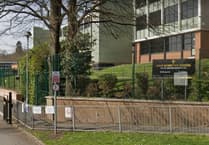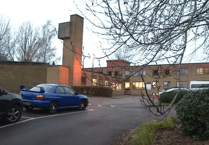A head teacher is urging local parents to rethink their negative perceptions of Abergavenny’s newest primary school which has been cited as a role model for other Welsh schools in a new Estyn report.
Deri View has undergone a sea change in the past three years, significantly improving educational standards while turning a £170,000-plus budget deficit into a £22,000 surplus.
It’s one of 18 schools across Wales - the only one in Monmouthshire - featured as a case study in a new Estyn report entitled ‘Leadership and Primary School Improvement’.
Headteacher Sarah Davies (pictured) has also been invited to describe Deri View’s ‘journey’ at Estyn’s annual ‘Best Practice’ conferences in both North and South Wales.
The report draws on case studies and inspection evidence to illustrate successful improvement schemes for schools at different stages of development.
It also shows how schools can learn from each other’s experiences.
Effective leadership is highlighted as the most important influence in raising standards, improving teaching and learning and embedding a culture of self-improvement.
Deri View consists of both a primary school and nursery school, along with a specialist unit for pupils with moderate special educational needs.
On the same site there is also an integrated children’s centre, managed by Monmouthshire County Council.
The school was inspected by Estyn in January 2013 and judged to be in need of monitoring.
At the time it had a significant budget deficit of over £171,000 and new headteacher Sarah Davies was working tirelessly to agree a budget recovery plan with MCC.
The school was also heavily over-staffed.
Estyn inspectors, however, revisited the school in March 2014 and judged that the school had made good progress against the recommendations of the January 2013 inspection and removed it from Estyn monitoring.
The ‘Leadership and Primary School Improvement’ case-study highlights how the turnaround at Deri View has been achieved.
The main focus was on improving the leadership skills of senior staff; improving the quality of teaching and the use of assessment; raising standards in English and mathematics and reducing the budget deficit.
To achieve the latter some tough decisions had to be taken.
The new head’s first task on returning to her home town of Abergavenny from Newport was to reduce the staffing levels by ‘losing’ two full-time teachers and 22 support staff.
“It was a daunting prospect and obviously very unpopular - but everyone rallied round,” she said.
She also established that the local authority rather than the school would in future cover the running costs for the integrated children’s centre.
She stressed that the staff were ‘not to blame in any way’ for the situation that Deri View was in when she took over. The problem was a lack of investment in their development.
“Upskilling individuals is no good - you have to upskill everyone and find a model to do that economically and effectively,” she said.
“All along I’ve had fantastic support from the staff here, whose skills are outstanding.”
Sarah had worked on developing leadership skills at her previous schools and was able to transfer that invaluable experience to Deri View.
With the new, streamlined team she introduced an active, action-based training regime, bringing specialist consultants into the school to run intensive workshops, setting tasks for the teachers to carry out with their pupils and returning to discuss progress.
With the teaching staff better equipped to improve pupils’ numeracy and literacy skills, the school’s learning support assistants were also trained to deliver literacy ‘catch-up’ programmes.
The focus on leadership development at Deri View has meant that, in the past 18 months, five senior staff have secured jobs as head teachers or deputy head teachers at other schools - underlining the importance of ‘upskilling’ ALL staff to ensure that the school continues on its improvement journey.
Since September 2015, the senior leadership team has been made up of the headteacher, an acting deputy headteacher (seconded from another school), a Foundation Phase leader, a teacher in charge of a specialist learning resource base and a leader for additional learning needs.
That team is supported by four ‘middle leaders’, responsible for important aspects of the school’s work, who have been given the chance to develop their careers in a variety of ways including shadowing opportunities which extend beyond the school as a result of the headteacher undertaking a temporary executive headship, supporting two other schools within the local authority.
A new internal communication system has also been introduced - with laptops purchased for all teachers and higher-level teaching assistants, to keep them up to date with day-to-day activities and enable them to share planning and other relevant information.
As well as improving standards in English and mathematics, the headteacher has widened the curriculum. A member of the middle leadership team is now a ‘philosophy for children’ accredited trainer who has developed her colleague’s knowledge of how to deliver philosophy sessions.
The school has also invested heavily in improving staff’s knowledge of digital technology and digital resources.
The consequence of all this hard work, according to the report is that:
* In 2015, 87% of Year 6 pupils achieved the expected level in English, a 12 percentage point increase from 2012, and 85% of pupils achieved the expected level or above in mathematics, a 12 percentage point increase from 2012
•Pupils’ ability to think for themselves and work independently has improved through the whole school approach to developing literacy through philosophy, multimedia and drama;
•Pupils enjoy attending school and rates of attendance are consistently good;
* The school has a consistent approach to developing pupils’ literacy and numeracy skills;
•There is an appropriate system for assessing and monitoring pupil progress and effective systems to use this information to support under-achieving pupils;
•The school is led by a team of professionals with the necessary skills and knowledge to bring about improvements;
•Information and development opportunities are communicated and shared well across the school;
•At the end of the 2014-2015 financial year, the school recorded a budget surplus of £22,000;
•The school is now appropriately staffed for the number of pupils on roll.
Estyn Chief Inspector, Meilyr Rowlands, said, “Every school has its own challenges, but all schools can improve. For effective improvement you need leaders with a clear vision of what needs to change.”
Sarah Davies is painfully aware of the perception of Deri View as a school on a local authority housing estate where pupils, parents and staff are not aspirational - but she says this is ‘simply not the case’.
“I think it’s important to look at where Deri View sits nationally. It’s the newest school in town, with outstanding resources and provision yet it struggles to attract families because of its location.
“The question has to be ‘Why are parents not looking at the standards here rather than distorted socio-economics?”
To follow Deri View’s ’journey’ in more depth, the Estyn report, commissioned by the Welsh Assembly Government, is available at estyn.gov.wales/thematic-reports



